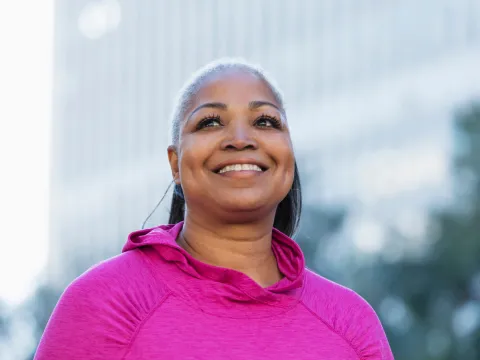- AdventHealth

Choose the health content that’s right for you, and get it delivered right in your inbox.
Do you know someone who’s gone or is currently going through breast cancer? Chances are, you do. That’s because 1 in 8 women in the United States develops the disease. This year, in fact, more than 350,000 U.S. women are expected to hear they have breast cancer, according to the American Cancer Society (ACS).
Breast Cancer Awareness Month is observed every October. And we’re doing our part to help raise awareness of the disease, along with the importance of breast cancer screenings and prevention. We honor those currently battling breast cancer, as well as the brave women who came before us and valiantly fought the disease.
Whether you’re facing a diagnosis yourself or need a breast cancer screening, our experienced, compassionate breast cancer specialists are here for you, providing you the best in breast care to meet your every need to live your best life.
Facts About Breast Cancer
Aside from skin cancer, breast cancer is the most common cancer to affect American women. Although rare, breast cancer can affect men, too. Around 3,000 men in the United States are expected to be diagnosed with breast cancer in 2023.
Breast cancer forms in the tissues of the breast, most often in the lobules (the glands that make breast milk) or in the ducts (the small canals that carry milk to the nipple).
What type of breast cancer you have is determined by which kind of breast cells are affected. Most breast cancers, like ductal carcinoma in situ (DCIS), are carcinomas, which develop when cancer starts in the milk ducts’ gland cells.
Breast cancer can spread when cancer cells get into the blood or lymph system and are carried to other parts of the body. When breast cancer spreads, it’s called metastatic breast cancer. Breast cancer spreads most often to the bones, liver, lungs and brain.
Breast Cancer FAQs Answered
Some of the most frequently asked questions about breast cancer are, “what are my risk factors for breast cancer,” and “what are the symptoms of breast cancer? We’re here to help shine some light on these questions to help empower you.
What Are My Risk Factors for Breast Cancer?
Your breast cancer risk generally depends on a combination of factors — some you can control and others you can’t.
Some breast cancer risk factors you can’t change are:
- Age (most breast cancers are diagnosed after age 50)
- Dense breasts
- Family history of breast or ovarian cancer
- Genetic mutations, such as BRCA1 and BRCA2
- Personal history of breast cancer
Some risk factors you may be able to change, however, by:
- Avoiding drinking alcohol
- Losing excess weight
- Staying physically active
- Taking hormones
What Are Common Breast Cancer Symptoms?
Some women experience symptoms that point to breast cancer, but it’s important to note that some don’t have any, which is why we can’t emphasize the importance of breast cancer screenings enough.
That said, one of the most common breast cancer symptoms is a new lump in the breast or under the arm; however, only about 10% of these go on to be diagnosed as breast cancer.
Other possible breast cancer symptoms include:
- Nipple discharge
- Nipple retraction (turning inward)
- Skin dimpling
- Swelling
Most of these symptoms can be caused by conditions other than breast cancer, but it’s important to have any new change in the breasts checked by your doctor.
Also, because finding breast cancer early can affect treatment options and improve outcomes, annual mammograms, which are the most common screening test for breast cancer, are recommended for many women starting at age 40.
We encourage women ages 40 to 44 talk to their doctor about whether they should start annual breast cancer screenings, women ages 45 to 54 get a mammogram every year, and for women 55 and older switch to getting a mammogram every two years.
Women under the age of 40 considered to have a high breast cancer risk are recommended to begin screenings earlier. Reach out to your doctor to get started.
Debunking Breast Cancer Myths
Despite advancements in breast cancer treatment and diagnostics, myths still swirl around the disease. Here are a few common misconceptions followed by the facts about breast cancer:
- MYTH: Breast cancer only affects middle-aged or older women.
TRUTH: While most cases of breast cancer do develop in middle-aged or older women, the disease can affect anyone. About 9% of new breast cancer cases in the United States arise in women under the age of 45. - MYTH: Finding a lump in your breast means you have breast cancer.
TRUTH: Only a small number of breast lumps turn out to be cancer, but it’s impossible to know until you get it checked out. - MYTH: Having a family history of breast cancer means you’ll likely develop it, too.
TRUTH: Most women with breast cancer have no family history of the disease. - MYTH: If you have the BRCA1 or BRCA2 gene mutation, you’ll develop breast cancer.
TRUTH: Although having one of these gene mutations raises your risk for breast cancer, it’s certainly not a guarantee. Still, if you know you have a family member, such as a mom or sister, who carries the BRCA1 or BRCA2 mutation, being tested can help you learn if you can take steps to prevent developing cancer. - MYTH: All breast cancers are the same.
TRUTH: There are many different types of breast cancer that can develop depending on which cells are affected. The type of cancer you have and whether it’s spread typically determines your treatment and, potentially, your side effects.
Compassionate Breast Cancer Care
At AdventHealth, you don’t have to navigate a breast cancer diagnosis alone. Our team of world-class breast cancer specialists walk beside you throughout your cancer journey and beyond to support you and help you stay strong.
We also offer some of the latest advancements in breast cancer treatment, like genetic counseling, testing and imaging. Minimally invasive diagnostic technology is available, such as high-definition breast MRIs and minimally invasive stereotactic breast biopsy, so you can get clarity and be on the road to recovery as soon as possible.
Visit us here to learn more about our women’s health services and comprehensive cancer care program. We’re here to keep you whole this Breast Cancer Awareness Month and every day.


